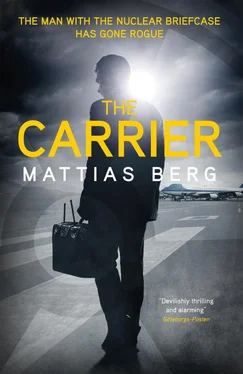Mattias Berg - The Carrier
Здесь есть возможность читать онлайн «Mattias Berg - The Carrier» весь текст электронной книги совершенно бесплатно (целиком полную версию без сокращений). В некоторых случаях можно слушать аудио, скачать через торрент в формате fb2 и присутствует краткое содержание. Город: London, Год выпуска: 2019, ISBN: 2019, Издательство: MacLehose Press, Жанр: Триллер, на английском языке. Описание произведения, (предисловие) а так же отзывы посетителей доступны на портале библиотеки ЛибКат.
- Название:The Carrier
- Автор:
- Издательство:MacLehose Press
- Жанр:
- Год:2019
- Город:London
- ISBN:978-0-85705-788-4
- Рейтинг книги:4 / 5. Голосов: 1
-
Избранное:Добавить в избранное
- Отзывы:
-
Ваша оценка:
- 80
- 1
- 2
- 3
- 4
- 5
The Carrier: краткое содержание, описание и аннотация
Предлагаем к чтению аннотацию, описание, краткое содержание или предисловие (зависит от того, что написал сам автор книги «The Carrier»). Если вы не нашли необходимую информацию о книге — напишите в комментариях, мы постараемся отыскать её.
The Carrier — читать онлайн бесплатно полную книгу (весь текст) целиком
Ниже представлен текст книги, разбитый по страницам. Система сохранения места последней прочитанной страницы, позволяет с удобством читать онлайн бесплатно книгу «The Carrier», без необходимости каждый раз заново искать на чём Вы остановились. Поставьте закладку, и сможете в любой момент перейти на страницу, на которой закончили чтение.
Интервал:
Закладка:
“Thanks,” was all I could say.
But it was not the Nurse answering.
“Thanks to you too, my treasure. The secret is to find the right assistants,” Ingrid Bergman said.
2.02
The dreams, through the chemical haze, came back more viciously than ever.
I had endured terrible nights for so many years. Ever since I started my research work in the ’90s.
I thought it must be because of the stress. The endless threat of being unmasked. Not just academically, with a supervisor who demanded so much, but in my whole double—or maybe even triple—life. The apparently incompatible identities which in some way came to meld like an alloy: family man, moral philosopher and Carrier. All of that has to seep out in one way or another, even with a person like me.
From the start, the dreams were of violence. Flashes of hyper-realistic visions of me doing the most appalling things to friends or family, those I held most dear. First to my mother. Soon to Amba, even to the children.
As I began to study the history of atomic weapons, my academic work became woven into these brutal scenes. Images of burning buildings, cities crumbling, bubbling with cooking asphalt and human remains, as if out of a documentary: sleeping hallucinations rather than ordinary dreams.
I was always the one playing the main character—even though my identities in the dreams changed. The only thing they had in common was the savage acts which ended them, often carried out in similar fashion. I could not tell a single other person about this. Not my supervisor, Ingrid Bergman, not Amba. And never, ever, our team’s psychologists.
The series of macabre images this particular night—the last dream, the one which woke me up: the only one you can ever remember with any sort of precision—ended with me once again being Robert Oppenheimer. In the most classic scene of them all.
The nuclear test went by the code name “Trinity”. A small group of researchers gathered outside the little town of Alamogordo on July 16, 1945: for the first time able to see the effects of my creation, little more than three weeks before testing it for real over Hiroshima. The result of our combined efforts. In a little more than three years, more or less around the clock.
The setting was as high-tension as the experiment itself. Beethoven’s 5th Symphony, the Destiny Symphony, boomed through the concrete bunker from an old-style portable gramophone, while the thunder outside rumbled along with the music. I waited, impatient, sulking, keeping myself apart from the other researchers and senior military until the storm had passed overhead. Kept scribbling until the last moments, noting down my speculations as to how strong the explosion was going to be—pure guess-work—on the little notepad with squared paper. When the time came, I walked slowly out of the bunker to observe the miracle in the desert with my own eyes.
And for an instant it seemed as if all my calculations inside the secret laboratory had been underestimates: as if the atmosphere itself had caught fire.
The landscape was bathed in a glowing light many times stronger than the midday summer sun. The color was at once and in some incomprehensible way both golden and purple. The reflection lit up every mountain top, each ridge, the smallest crack in the surrounding peaks, with a clarity and beauty which nobody could later capture in words. I reflected that this is the awe the poets have sought to describe throughout the millennia.
Thirty seconds later came the pressure wave and straight after it the indescribable roar, a resounding premonition of Doomsday. An event of extreme violence which only the Almighty could have created before. When the whole sequence of events began to ebb—even at my distance it felt as if some low-pressure area were sucking everything from us, like waves washing out from a beach—we started to pump each other’s hands. Slapped each other on the back, laughed like children, giggled in relief, almost in a state of hysteria.
The mathematician with whom I had made a bet as to whether or not the experiment would ignite the universe asked for his ten dollars, a boyish smile on his lips. I smiled back, a little ashamed. In part because I never thought that anything of that sort would indeed occur—that I was the one chosen to cause the world to end: Ragnarök itself—but rather had assumed that his more or less playful bet had been some sort of incantation to protect us. And in part because I had no money on me.
So I asked if I could instead pay by giving him a quotation, which I had come to think of while all this was happening. He looked at me, skeptical, with his childish mathematician’s face, not understanding. Then he slowly nodded.
The words are from The Bhagavad Gita , I told him, the Hindu scripture that as a spiritual seeker I always had close to my heart. They describe how the god Vishnu tried to frighten the Prince into doing his duty. I intoned them for the mathematician: Now I am become death, the destroyer of worlds .
He looked bewildered, as if he had expected more, but then seemed satisfied. Started to say that the quotation could well be worth ten dollars, as strange as that was!
But then he got no further—before I started to tear off his head, taking great pains in doing so, the same way one twists and pulls at a root to extract it from the soil. And only when I had got this close to him did I discover that the mathematician bore a striking resemblance to my youngest child.
Who, furthermore, had the same name as the prototype of the bomb. The one which an unfathomable chain of events had just detonated, without igniting the universe after all.
Trinity. The light of my life.
2.03
I could not stop fiddling with the bandages, despite the excruciating pain, trying to work out what she had done.
The whole area between the upper part of my cheeks and my hairline burned like the fires of hell. The Nurse had made what seemed to be her biggest intervention around the eyes, had no doubt changed both their size and shape. That tends to have the greatest impact. Changing the look, the expression, the whole personality with the help of the “mirror of the soul”. Then continued up over the forehead. Made it bigger or maybe smaller, lifted, smoothed, put in wrinkles. Taken away or added a number of years.
For hours I had lain and waited for the woman in the bunk next to me to wake up, Ingrid Bergman, Alpha, so that she could tell me who I was. What I had become. I had the cannula in the back of my left hand, and over the same wrist the security strap of the briefcase which, thanks to the Nurse’s first bravura performance, was without its tracking mechanism. Now, for sure, we were “lost to the world”, as Ingrid Bergman had told us.
My watch indicated 19.52, September 9, 2013, depth negative 307.7 feet. I stuffed the notebook back into the very bottom of my combat pack. Put aside my chronicle for you in posterity, my account of everything that had happened since we left the fallout shelter three days ago. The night lights in the roof of the enormous rock chamber, sixty-five feet up, had been just enough for me to keep working on my chronicle as I peered through the minimal slits between the bandages covering my eyes.
I lay on my back in the stone-hard bunk. Tried to find a position in which I was comfortable. And, at that moment, Ingrid Bergman woke up.
Sat upright, cast her eyes around, ran her hands over her face. Then looked straight at me. Even she was covered in bandages, all the way down over her throat. But her voice was intact—although her lips too must have been modified. The melody floated out through the narrow opening where the mouth was, seemed to fill the whole rock hall, all the way up to the roof.
Читать дальшеИнтервал:
Закладка:
Похожие книги на «The Carrier»
Представляем Вашему вниманию похожие книги на «The Carrier» списком для выбора. Мы отобрали схожую по названию и смыслу литературу в надежде предоставить читателям больше вариантов отыскать новые, интересные, ещё непрочитанные произведения.
Обсуждение, отзывы о книге «The Carrier» и просто собственные мнения читателей. Оставьте ваши комментарии, напишите, что Вы думаете о произведении, его смысле или главных героях. Укажите что конкретно понравилось, а что нет, и почему Вы так считаете.












